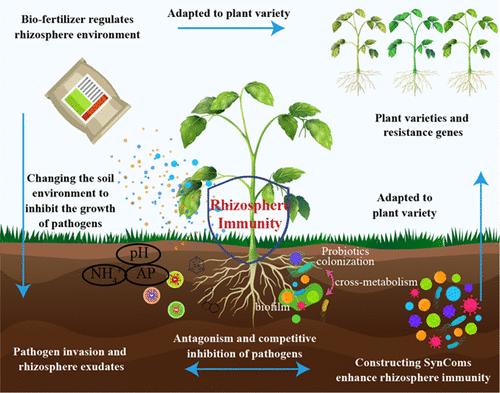当前位置:
X-MOL 学术
›
J. Agric. Food Chem.
›
论文详情
Our official English website, www.x-mol.net, welcomes your
feedback! (Note: you will need to create a separate account there.)
Advances in Rhizosphere Microbiome and Rhizosphere Immunity Effect: A Review
Journal of Agricultural and Food Chemistry ( IF 5.7 ) Pub Date : 2025-06-03 , DOI: 10.1021/acs.jafc.5c02003
Zhurui Tang, Wenbing Tan, Rong Li, Ling Weng, Xinlong Chen, Beidou Xi, Dianqiu Lv
Journal of Agricultural and Food Chemistry ( IF 5.7 ) Pub Date : 2025-06-03 , DOI: 10.1021/acs.jafc.5c02003
Zhurui Tang, Wenbing Tan, Rong Li, Ling Weng, Xinlong Chen, Beidou Xi, Dianqiu Lv

|
Rhizosphere immunity, an emerging concept, involves complex interactions among plant roots, rhizospheric microbiota, and the soil environment that collectively safeguard plant health. Although extensively studied, the mechanisms driving rhizosphere immunity remain insufficiently elucidated. Rhizosphere microbes enhanced plant immunity through colonization, ISR/SAR induction, and interactions with root exudates and endophytes, triggering defense signals, producing antimicrobials, and modulating host metabolism. Organic and bioorganic fertilizers enhanced these effects by reshaping microbial communities, enriching beneficial taxa, and indirectly promoting resistance via improved nutrient cycling and soil health. Synthetic microbial communities (SynComs) have been developed to stabilize and enhance biocontrol. Four scalable SynComs design strategies have emerged: reductionist approaches for mechanistic insight, antagonistic combinations, core microbiome-based assemblies using keystone taxa, and resource competition to outcompete pathogens. Together, these approaches offer scalable solutions to construct stable and functional SynComs that enhance rhizosphere immunity. Future efforts should focus on translating rhizosphere immunity into agriculture by elucidating microbiome–plant–soil interactions and optimizing long-term soil management.
中文翻译:

根际微生物组和根际免疫效应的研究进展
根际免疫是一个新兴概念,涉及植物根系、根际微生物群和土壤环境之间的复杂相互作用,共同保护植物健康。尽管进行了广泛的研究,但驱动根际免疫的机制仍未充分阐明。根际微生物通过定植、ISR/SAR 诱导以及与根系分泌物和内生菌的相互作用、触发防御信号、产生抗菌剂和调节宿主代谢来增强植物免疫力。有机和生物有机肥料通过重塑微生物群落、丰富有益分类群并通过改善养分循环和土壤健康间接促进抗性来增强这些效果。合成微生物群落 (SynComs) 已被开发用于稳定和增强生物控制。已经出现了四种可扩展的 SynComs 设计策略:用于机制洞察的还原主义方法、拮抗组合、使用关键分类群的基于核心微生物组的组装以及击败病原体的资源竞争。这些方法共同提供了可扩展的解决方案,以构建稳定且功能性的 SynCom,从而增强根际免疫力。未来的工作应侧重于通过阐明微生物组-植物-土壤的相互作用和优化长期土壤管理,将根际免疫转化为农业。
更新日期:2025-06-03
中文翻译:

根际微生物组和根际免疫效应的研究进展
根际免疫是一个新兴概念,涉及植物根系、根际微生物群和土壤环境之间的复杂相互作用,共同保护植物健康。尽管进行了广泛的研究,但驱动根际免疫的机制仍未充分阐明。根际微生物通过定植、ISR/SAR 诱导以及与根系分泌物和内生菌的相互作用、触发防御信号、产生抗菌剂和调节宿主代谢来增强植物免疫力。有机和生物有机肥料通过重塑微生物群落、丰富有益分类群并通过改善养分循环和土壤健康间接促进抗性来增强这些效果。合成微生物群落 (SynComs) 已被开发用于稳定和增强生物控制。已经出现了四种可扩展的 SynComs 设计策略:用于机制洞察的还原主义方法、拮抗组合、使用关键分类群的基于核心微生物组的组装以及击败病原体的资源竞争。这些方法共同提供了可扩展的解决方案,以构建稳定且功能性的 SynCom,从而增强根际免疫力。未来的工作应侧重于通过阐明微生物组-植物-土壤的相互作用和优化长期土壤管理,将根际免疫转化为农业。


















































 京公网安备 11010802027423号
京公网安备 11010802027423号